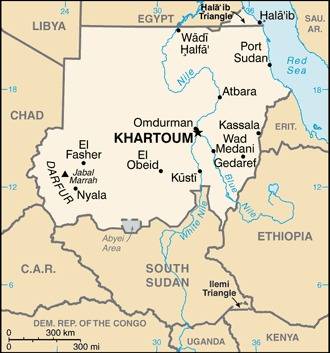Recent Sudanese history paints the current conflict waging between the Sudanese Armed Forces (SAF) and the Rapid Support Force (RSF) as a “byproduct” of the political and military conditions brought about by the overthrow of former president Omar El Bashir in a military coup in the wake of a popular protest in April 2019.
Residents in Khartoum, Sudan’s capital city, told various news outlets and writers, including Africa Watch and the London-based Guardian, that the night of Eid al-Fitr—representing the end of Ramadan—had been quieter since the beginning of the weeklong conflagration. And with the civilian population in major cities across the North African country caught in the crossfire, “shelling and clashes between the armed forces and the RSF” continues, according to the Central Committee of Sudan Doctors.

The latest count, according to The World Health Organization, says at least 413 people have been killed with nearly 4,000 people injured since fighting broke out.
One very prominent Khartoum resident, from an influential family, whom this writer spent much time with while living in the capital city, and who for obvious reasons, with the RSF operating in his neighborhood, wanted to remain anonymous, said he “was shot at by a sniper while returning home” from a Masjid where he went with his son to pray.
Tensions between General Abdul Fattah Al-Burhan, the head of the military and leader of the Sovereign Council, and Mohamed Hamdan Daglo, or Hemedti, head of the RSF and deputy head of the Sovereign Council, began to escalate after negotiations to integrate the estimated 100,000 RSF into the regular army broke down.
According to Dr. Muhammad Elamin the problem became not the “integration of (Hemedti’s) forces … but how long is this process going to take.” Elamin, who spoke from his home in Brighton in the UK, added, “If this was purely a technical exercise, the Sudanese army, which has had to integrate forces in the past, or militia forces could be done in about two years.”
Elamin is a consultant physician and clinical toxicologist whose parents are Sudanese. He is very astute with staying on top of Sudanese politics and said Hemedti refused. “Hemedti said this has to be done (over the course of) 10 years … he was actually pushing for 14 years,” said Elamin.
He then raised the issue of Hemedti wanting to maintain the RSF his principal source of power. “You want to keep that force … which gives you political clout …while there is a political transition.” In addition, Elamin said, “Hemedti requested as part of the negotiations that he doesn’t answer to the commander and chief of the Sudanese army, but rather he answers to the future civilian head of government. During several recent press briefings, Hemedti called for a civilian government.”
Elamin noted in his observation that Hemedti was in effect creating two military institutions. “So this was the sticking point that led to things boiling over,” he explained.
A defining face of Sudan’s military regime is the extent to which it has penetrated the economy and especially rural society. The model is Egypt and its military-backed regime, which controls much of Egypt’s commercial enterprise. It has militarized much of Sudan’s commercial sector and increasingly in the rural sector as well. Additionally, Hemedti has extensive commercial holdings owned by him and his family. His RSF is the de facto governing power in Darfur and appears in many of the rural areas in Sudan.
In a widely circulated media report, Hemedti was quoted as saying: “People ask where do we (the RSF) bring this money from? We have the salaries of our troops fighting outside (abroad) and our gold investments, money from gold and other investments.”
Elamin said a number of factors have enriched Hemedti, including the war in Yemen. “When the war broke out Saudi (Arabia) and the Emeritus, needed people to fight for them. They didn’t have the stomach and capability to send in their own armed forces. They were conducting mainly an aerial campaign of bombardment.” In addition, he said, Hemedti has had forces fighting in Libya “alongside of General Khalifa Belqasim Hafta,” and was involved in fighting in the Central African Republic.
Concerning Sudan’s rich gold deposits, mainly in Darfur, “it seems he managed to secure a monopoly. This gold is widely believed was being mined and refined and then exported but not necessarily through official channels. The allegation is that a lot of it was going to neighboring countries and ending up in places like Russia,” Elamin added.
According to Reuters, Hemedti’s family gold firm Algunade, bypassed central bank controls over gold exports and sold gold to Gulf states, including Dubai.
Mekki El-Mograbi, journalist and former diplomat working in U.S. representing the Sudanese government, said via WhatsApp, and Elamin confirmed, that Hemedti has bought up much residential real estate in Khartoum and cities throughout Sudan. Mograbi said Hemedti had put his RSF troops in these residential locations and that the troops are going to be difficult to uproot without civilian casualties. Follow @JehronMuhammad on Twitter













